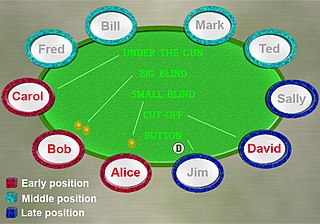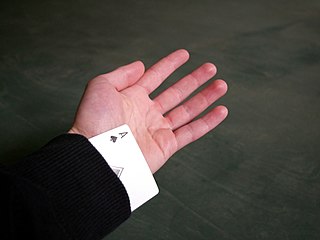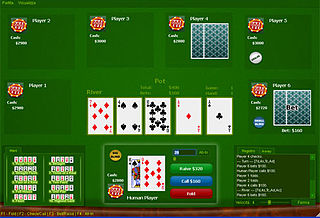
Poker is a family of comparing card games in which players wager over which hand is best according to that specific game's rules. It is played worldwide, but in some places the rules may vary. While the earliest known form of the game was played with just 20 cards, today it is usually played with a standard 52-card deck, although in countries where short packs are common, it may be played with 32, 40 or 48 cards. Thus poker games vary in deck configuration, the number of cards in play, the number dealt face up or face down and the number shared by all players, but all have rules that involve one or more rounds of betting.
Protection in poker is a bet made with a strong but vulnerable hand, such as top pair when straight or flush draws are possible. The bet forces opponents with draws to either call with insufficient pot odds, or to fold, both of which are profitable for the betting player. By contrast, if he failed to protect his hand, another player could draw out on him at no cost, meaning he gets no value from his made hand.
In poker, pot odds are the ratio of the current size of the pot to the cost of a contemplated call. Pot odds are compared to the odds of winning a hand with a future card in order to estimate the call's expected value. The purpose of this is to statistically guide a player's decision between the options of call or fold. Raising is an alternative to place this decision on the opponent.
In the game of poker, opens and raises are considered aggressive plays, while calls and checks are considered passive. It is said that "aggression has its own value", meaning that often aggressive plays can make money with weak hands because of bluff value. In general, opponents must respond to aggressive play by playing more loosely, which offers more opportunities to make mistakes.

In the card game of poker, a bluff is a bet or raise made with a hand which is not thought to be the best hand. To bluff is to make such a bet. The objective of a bluff is to induce a fold by at least one opponent who holds a better hand. The size and frequency of a bluff determines its profitability to the bluffer. By extension, the phrase "calling somebody's bluff" is often used outside the context of poker to describe situations where one person demands that another proves a claim, or proves that they are not being deceptive.

In the game of poker, the play largely centers on the act of betting, and as such, a protocol has been developed to speed up play, lessen confusion, and increase security while playing. Different games are played using different types of bets, and small variations in etiquette exist between cardrooms, but for the most part the following rules and protocol are observed by the majority of poker players.

Texas hold 'em is the most popular variant of the card game of poker. Two cards, known as hole cards, are dealt face down to each player, and then five community cards are dealt face up in three stages. The stages consist of a series of three cards, later an additional single card, and a final card. Each player seeks the best five-card poker hand from any combination of the seven cards: the five community cards and their two hole cards. Players have betting options to check, call, raise, or fold. Rounds of betting take place before the flop is dealt and after each subsequent deal. The player who has the best hand and has not folded by the end of all betting rounds wins all of the money bet for the hand, known as the pot. In certain situations, a "split pot" or "tie" can occur when two players have hands of equivalent value. This is also called "chop the pot". Texas hold 'em is also the H game featured in HORSE and HOSE.
Slow playing is a deceptive play in poker where a player bets weakly or passively with a strong holding. It is the opposite of fast playing. A flat call can be a form of slow playing. The objective of slow playing is to lure opponents into a pot who might fold to a raise, or to cause them to bet more strongly than they would if the player had played aggressively. Slow playing sacrifices protection against hands that may improve and risks losing the pot-building value of a bet if the opponent also checks.

Cheating in poker is any behavior outside the rules of poker that is intended to give an unfair advantage to one or more players.

A poker tournament is a tournament where players compete by playing poker. It can feature as few as two players playing on a single table, and as many as tens of thousands of players playing on thousands of tables. The winner of the tournament is usually the person who wins every poker chip in the game and the others are awarded places based on the time of their elimination. To facilitate this, in most tournaments, blinds rise over the duration of the tournament. Unlike in a ring game, a player's chips in a tournament cannot be cashed out for money and serve only to determine the player's placing.

Mike A. Caro is an American professional poker player, pioneer poker theorist, author of poker books, and casino executive.

Online poker is the game of poker played over the Internet. It has been partly responsible for a huge increase in the number of poker players worldwide. Christiansen Capital Advisors stated online poker revenues grew from $82.7 million in 2001 to $2.4 billion in 2005, while a survey carried out by DrKW and Global Betting and Gaming Consultants asserted online poker revenues in 2004 were at $1.4 billion. In a testimony before the United States Senate regarding Internet Gaming, Grant Eve, a Certified Public Accountant representing the US Accounting Firm Joseph Eve, Certified Public Accountants, estimated that one in every four dollars gambled is gambled online.
Tilt is a poker term for a state of mental or emotional confusion or frustration in which a player adopts a suboptimal strategy, usually resulting in the player becoming overly aggressive. Tilting is closely associated with another poker term, "steam".
In poker, bad beat is a subjective term for a hand in which a player with what appear to be strong cards nevertheless loses. It most often occurs where one player bets the clearly stronger hand and their opponent makes a mathematically poor call that wins with any subsequent dealing to complete the hand.
Calling station is a poker term used to pejoratively describe someone who consistently calls bets and rarely raises, regardless of the strength of his or her hand. In Texas hold 'em and other community card poker games, calling stations are sometimes rewarded for their poor play by lucky cards that come on the board, often encouraging unskilled players to overestimate their skill level. Many calling stations can be found on low stakes tables both on the Internet, in online poker rooms, and in traditional bricks and mortar card rooms.
Poker tools are a variety of software or web-based applications that allow the statistical analysis of poker players, games or tournaments.
Advantage gambling, or advantage play, refers to legal methods used to gain an advantage while gambling, in contrast to cheating. The term usually refers to house-banked casino games, but can also refer to games played against other players, such as poker. Someone who practices advantage gambling is often referred to as an advantage player, or AP. Unlike cheating, which is by definition illegal, advantage play exploits innate characteristics of a particular game to give the player an advantage relative to the house or other players. While not illegal, advantage play may result in players being banned by certain casinos.
Duplicate poker is a variant of the card game poker. Duplicate poker is based on the principles of duplicate bridge, but it also incorporates some of the rules of pot limit and no limit Texas hold'em.
The following is a glossary of poker terms used in the card game of poker. It supplements the glossary of card game terms. Besides the terms listed here, there are thousands of common and uncommon poker slang terms. This is not intended to be a formal dictionary; precise usage details and multiple closely related senses are omitted here in favor of concise treatment of the basics.
Poker is a popular card game that combines elements of chance and strategy. There are various styles of poker, all of which share an objective of presenting the least probable or highest-scoring hand. A poker hand is usually a configuration of five cards depending on the variant, either held entirely by a player or drawn partly from a number of shared, community cards. Players bet on their hands in a number of rounds as cards are drawn, employing various mathematical and intuitive strategies in an attempt to better opponents.







